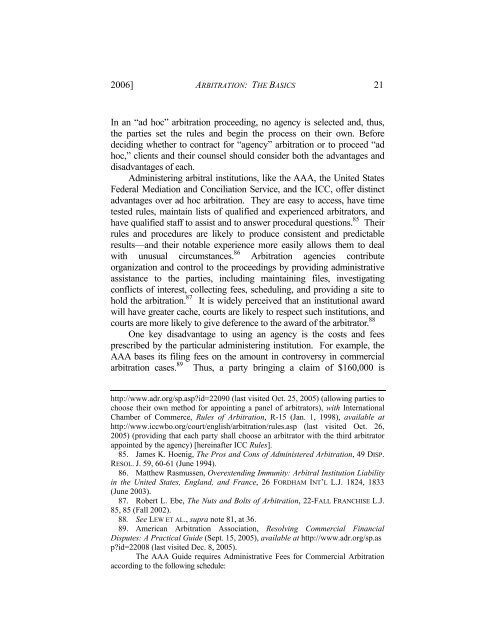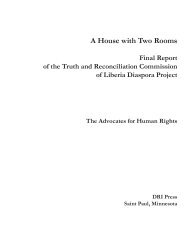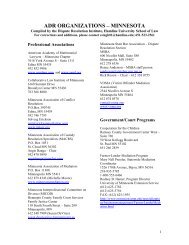2006/Vol. 5 No.1 - Hamline Law - Hamline University
2006/Vol. 5 No.1 - Hamline Law - Hamline University
2006/Vol. 5 No.1 - Hamline Law - Hamline University
You also want an ePaper? Increase the reach of your titles
YUMPU automatically turns print PDFs into web optimized ePapers that Google loves.
<strong>2006</strong>] ARBITRATION: THE BASICS 21<br />
In an “ad hoc” arbitration proceeding, no agency is selected and, thus,<br />
the parties set the rules and begin the process on their own. Before<br />
deciding whether to contract for “agency” arbitration or to proceed “ad<br />
hoc,” clients and their counsel should consider both the advantages and<br />
disadvantages of each.<br />
Administering arbitral institutions, like the AAA, the United States<br />
Federal Mediation and Conciliation Service, and the ICC, offer distinct<br />
advantages over ad hoc arbitration. They are easy to access, have time<br />
tested rules, maintain lists of qualified and experienced arbitrators, and<br />
have qualified staff to assist and to answer procedural questions. 85 Their<br />
rules and procedures are likely to produce consistent and predictable<br />
results—and their notable experience more easily allows them to deal<br />
with unusual circumstances. 86 Arbitration agencies contribute<br />
organization and control to the proceedings by providing administrative<br />
assistance to the parties, including maintaining files, investigating<br />
conflicts of interest, collecting fees, scheduling, and providing a site to<br />
hold the arbitration. 87 It is widely perceived that an institutional award<br />
will have greater cache, courts are likely to respect such institutions, and<br />
courts are more likely to give deference to the award of the arbitrator. 88<br />
One key disadvantage to using an agency is the costs and fees<br />
prescribed by the particular administering institution. For example, the<br />
AAA bases its filing fees on the amount in controversy in commercial<br />
arbitration cases. 89 Thus, a party bringing a claim of $160,000 is<br />
http://www.adr.org/sp.asp?id=22090 (last visited Oct. 25, 2005) (allowing parties to<br />
choose their own method for appointing a panel of arbitrators), with International<br />
Chamber of Commerce, Rules of Arbitration, R-15 (Jan. 1, 1998), available at<br />
http://www.iccwbo.org/court/english/arbitration/rules.asp (last visited Oct. 26,<br />
2005) (providing that each party shall choose an arbitrator with the third arbitrator<br />
appointed by the agency) [hereinafter ICC Rules].<br />
85. James K. Hoenig, The Pros and Cons of Administered Arbitration, 49 DISP.<br />
RESOL. J. 59, 60-61 (June 1994).<br />
86. Matthew Rasmussen, Overextending Immunity: Arbitral Institution Liability<br />
in the United States, England, and France, 26 FORDHAM INT’L L.J. 1824, 1833<br />
(June 2003).<br />
87. Robert L. Ebe, The Nuts and Bolts of Arbitration, 22-FALL FRANCHISE L.J.<br />
85, 85 (Fall 2002).<br />
88. See LEW ET AL., supra note 81, at 36.<br />
89. American Arbitration Association, Resolving Commercial Financial<br />
Disputes: A Practical Guide (Sept. 15, 2005), available at http://www.adr.org/sp.as<br />
p?id=22008 (last visited Dec. 8, 2005).<br />
The AAA Guide requires Administrative Fees for Commercial Arbitration<br />
according to the following schedule:
















